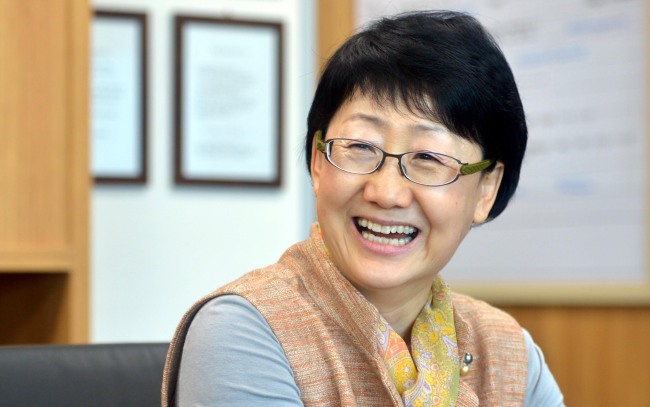[Herald Interview] Bridging digital divide in Asia-Pacific
By Shin Hyon-heePublished : May 11, 2014 - 20:24
This is the sixth installment in a series of interviews with chiefs of United Nations offices in Korea. ― Ed.
For Rhee Hyeun-suk, knowledge-sharing has been a lifelong task. She spent more than 20 years teaching information technology management at universities and helping Africa to improve its digital infrastructure at a U.N. agency in Addis Ababa.
Now as chief of the UN-APCICT in Incheon, her mission hovers between continents on a daily basis: to help developing countries to build their human, institutional ICT capabilities and bridge the digital divide between its 62 member countries.
“In essence, helping the poor is the raison d’etre of the U.N., its ethical obligation,” said Rhee, the 54-year-old director of the Asian and Pacific Training Center for Information and Communication Technology for Development.
For Rhee Hyeun-suk, knowledge-sharing has been a lifelong task. She spent more than 20 years teaching information technology management at universities and helping Africa to improve its digital infrastructure at a U.N. agency in Addis Ababa.
Now as chief of the UN-APCICT in Incheon, her mission hovers between continents on a daily basis: to help developing countries to build their human, institutional ICT capabilities and bridge the digital divide between its 62 member countries.
“In essence, helping the poor is the raison d’etre of the U.N., its ethical obligation,” said Rhee, the 54-year-old director of the Asian and Pacific Training Center for Information and Communication Technology for Development.

“As the manager of the APCICT, I am happy to see our programs get adopted in developing countries. But what’s more important is that they take part in the process and nurture ownership so we can make best practices together and raise the effectiveness.”
The organization was set up in 2006 as an institution of the U.N. Economic and Social Commission for Asia and the Pacific, the multinational agency’s regional development arm.
As the first U.N. office headquartered in South Korea, the APCICT focuses its work on three pillars ― training, research and advisory services. Together they make possible an integrated approach to ICT capacity building, according to Rhee.
The former professor at Georgia Tech and the University of Texas at Dallas has been at the helm of the agency since its inception. From 1997-2001, she also served as project manager for an intranet project, and then as chief of the Information Technology Centre for Africa at the U.N. Economic Commission for Africa, advising policymakers, professionals and businesses on various ICT issues.
One of the most rewarding moments, she recalled, came when it was decided at an ESCAP meeting in 2010 to make the APCICT, initially a five-year project office, a permanent organization.
“When we opened the office, there was a huge demand from developing countries to learn about South Korea’s ICT know-how. The ESCAP members backed the institute’s permanent status, while while the central and local governments here pledged to carry on its support,” Rhee said.
“Sitting in the conference room, I was so moved observing the representatives of some 20 countries speak in support of the continuation idea, saying they really want and need to improve their ICT capacity.”
In 2008, the APCICT launched a series of handbooks for policymakers, titled “Academy of ICT Essentials for Government Leaders.” The 10-module set is now available in 12 languages including English, Russian, Vietnamese and Pashto.
Its second edition came out in 2011, and the third, which is underway, is expected to better address the need for sustainable development and emergence of e-government.
Given the significance of youth education, the center also introduced its “Primer Series” guidelines in 2012, which are available in five languages, and has hosted workshops at more than 90 universities involving some 6,000 participants.
In line with surging demand, Rhee is hoping to cater to more developing countries beyond the region.
The institution currently puts its priority on 30 developing members in the Asia-Pacific. It works with 105 partners including other U.N. bodies, state agencies, academia, think tanks and civic groups to promote its work within and outside of the region.
“We’re leveraging partnerships to create a multiplier effect,” Rhee added. “We support other organizations, learn from them at times ― I never do anything in one direction.”
By Shin Hyon-hee (heeshin@heraldcorp.com)



![[AtoZ into Korean mind] Humor in Korea: Navigating the line between what's funny and not](http://res.heraldm.com/phpwas/restmb_idxmake.php?idx=644&simg=/content/image/2024/04/22/20240422050642_0.jpg&u=)
![[Exclusive] Korean military set to ban iPhones over 'security' concerns](http://res.heraldm.com/phpwas/restmb_idxmake.php?idx=644&simg=/content/image/2024/04/23/20240423050599_0.jpg&u=20240423183955)


![[Graphic News] 77% of young Koreans still financially dependent](http://res.heraldm.com/phpwas/restmb_idxmake.php?idx=644&simg=/content/image/2024/04/22/20240422050762_0.gif&u=)
![[Herald Interview] Why Toss invited hackers to penetrate its system](http://res.heraldm.com/phpwas/restmb_idxmake.php?idx=644&simg=/content/image/2024/04/22/20240422050569_0.jpg&u=20240422150649)






![[Exclusive] Korean military to ban iPhones over security issues](http://res.heraldm.com/phpwas/restmb_idxmake.php?idx=652&simg=/content/image/2024/04/23/20240423050599_0.jpg&u=20240423183955)



![[Today’s K-pop] Ateez confirms US tour details](http://res.heraldm.com/phpwas/restmb_idxmake.php?idx=642&simg=/content/image/2024/04/23/20240423050700_0.jpg&u=)